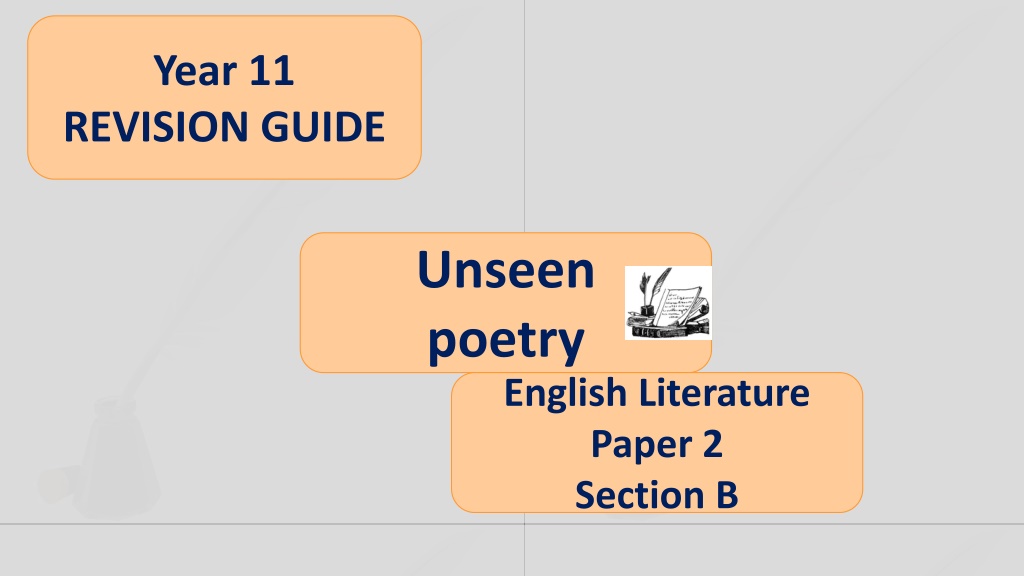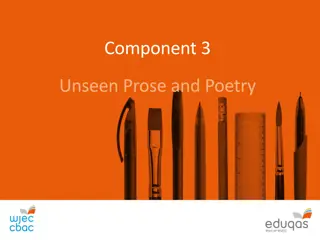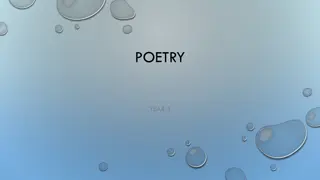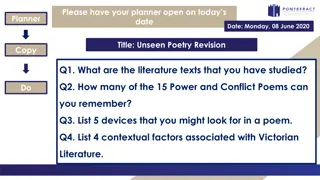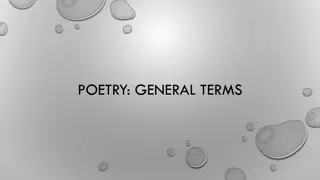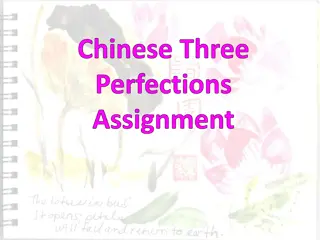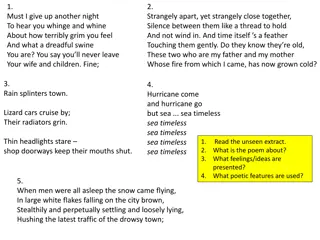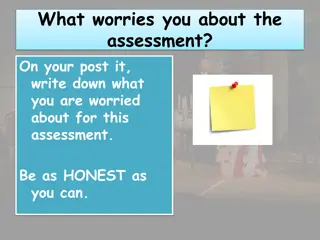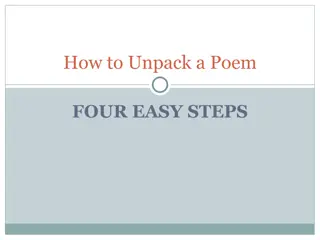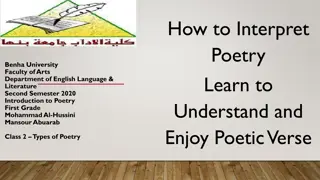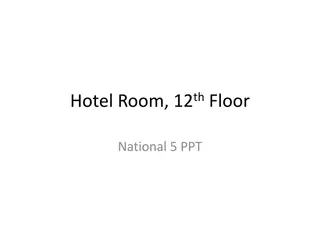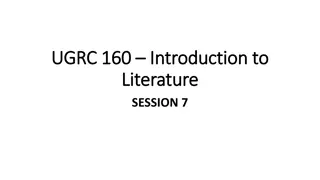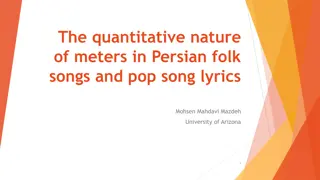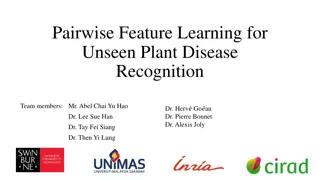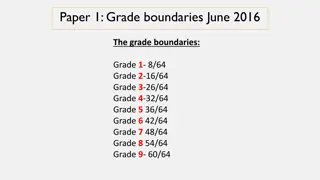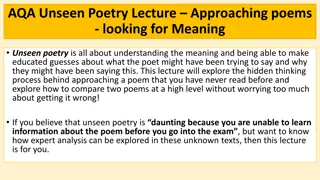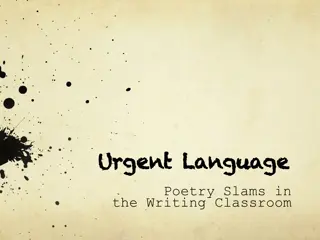Unseen Poetry Analysis Guide with Poem Examples
Explore the theme of death in unseen poetry with detailed analysis of poems such as "Funeral Blues" and "About His Person." Understand how poets use figurative language, metaphors, and imagery to convey deep emotions and messages. Practice identifying powerful quotations and literary devices to enhance your understanding and analysis skills.
Download Presentation

Please find below an Image/Link to download the presentation.
The content on the website is provided AS IS for your information and personal use only. It may not be sold, licensed, or shared on other websites without obtaining consent from the author.If you encounter any issues during the download, it is possible that the publisher has removed the file from their server.
You are allowed to download the files provided on this website for personal or commercial use, subject to the condition that they are used lawfully. All files are the property of their respective owners.
The content on the website is provided AS IS for your information and personal use only. It may not be sold, licensed, or shared on other websites without obtaining consent from the author.
E N D
Presentation Transcript
Year 11 REVISION GUIDE Unseen poetry English Literature Paper 2 Section B
Funeral Blues Stop all the clocks, cut off the telephone, Prevent the dog from barking with a juicy bone, Silence the pianos and with muffled drum Bring out the coffin, let the mourners come. You will be given one poem initially and there is a 24-mark question to complete. Let aeroplanes circle moaning overhead Scribbling on the sky the message He Is Dead , Put crepe bows round the white necks of the public doves, Let the traffic policemen wear black cotton gloves. He was my North, my South, my East and West, My working week and my Sunday rest, My noon, my midnight, my talk, my song; I thought that love would last for ever: I was wrong. So let s practise with this poem here Choose 3 quotations you know you could analyse well. The stars are not wanted now: put out every one; Pack up the moon and dismantle the sun; Pour away the ocean and sweep up the wood. For nothing now can ever come to any good. What makes a good choice? If your quotation is packed with power words you know that your analysis will be strong. Even better if there is a device being used. If there is, make sure you state that device and analyse it/ explore its effects. W. H. Auden This poem was originally written to mock somebody but Auden made changes to it and the poem is now considered to be moving and emotive. Quotation Power words worth pulling out Subject terminology Deeper meanings/ effects of line/ quotation
About His Person Five pounds fifty in change, exactly, a library card on its date of expiry. After you have completed this essay, you will see another poem and question to accompany it. You are required to THEN COMPARE THE 2 POEMS in a mini essay (this section is only worth 8 marks). A postcard stamped, unwritten, but franked, FIND 2 LINKS FOCUS ON METHODS AND THEIR EFFECTS Question 27.2 a pocket size diary slashed with a pencil from March twenty-fourth to the first of April. In both poems About his Person and Funeral Blues the poets explore the theme of death. What are the similarities and differences in how they explore death? A brace of keys for a mortise lock, an analogue watch, self-winding, stopped. Both poets use figurative language to express elements of the situation. In Funeral Blues he states He was my North, my South, my East and West which shows his regret at losing his loved one and how much his loved one meant to him. The metaphor implies the man was so important to him that he gave him direction and Auden followed him or was lead by him; he must have thought highly of him. In a similar way,in About his Person, Armitage states but beheaded in his fist/ a shopping list . This implies a task cut short and that he gave up on trivial things, suggesting, like most of the poem does, that he took his own life. Beheaded is a sharp and violent word suggesting a sudden and brutal end which is reflective of how he decided to die. A final demand in his own hand, a rolled up note of explanation planted there like a spray carnation but beheaded, in his fist. A shopping list. A giveaway photograph stashed in his wallet, a keepsake banked in the heart of a locket. no gold or silver, but crowning one finger a ring of white unweathered skin. That was everything. Simon Armitage Now complete your own second linked paragraph This pupil is heading for 6-
For Heidi with Blue Hair When you dyed your hair blue (or, at least ultramarine for the clipped sides, with a crest of jet-black spikes on top) you were sent home from school Make links My father thought it bloody queer, the day I rolled home with a ring of silver in my ear half hidden by a mop of hair. "You ve lost your head. If that s how easily you re led you should ve had it through your nose instead." And even then I hadn t had the nerve to numb the lobe with ice, then drive a needle through the skin, then wear a safety-pin. It took a jeweller s gun to pierce the flesh, and then a friend to thread the sleeper in, and where it slept the hole became a sore, became a wound, and wept. At twenty-nine, it comes as no surprise to hear my own voice breaking like a tear, released like water, cried from way back in the spiral of the ear. If I were you, I d take it out and leave it out next year. because, as the headmistress put it, although dyed hair was not specifically forbidden, yours was, apart from anything else, not done in the school colours. Tears in the kitchen, telephone-calls to school from your freedom-loving father: She s not a punk in her behaviour; it s just a style. (You wiped your eyes, also not in a school colour.) She discussed it with me first - we checked the rules. And anyway, Dad, it cost twenty-five dollars. Tel them it won t wash out - not even if I wanted to try. It would have been unfair to mention your mother s death, but that shimmered behind the arguments. The school had nothing else against you; the teachers twittered and gave in. S.Armitage Next day your black friend had hers done in grey, white and flaxen yellow - the school colours precisely: an act of solidarity, a witty tease. The battle was already won. Question 27.2: Compare how both poets explore the idea of rebellion F. Adcock
Now try to create a linked paragraph or two for yourself, answering this question Question 27.2: Compare THE METHODS used by both poets to explore the idea of rebellion
27.2 Both of these poems explore death. Compare how they do this. Use arrows to connect useful quotations again Roadside Fallen Hero I curl into someone's arms on this rainy day, Cry for a man I never knew and never loved. How his youngest son s heart must have Dive bombed, Then clotted in the depths of haunting fancies To see his father, a grandfather Fallen on the stairs. Waiting A life immortalised in a tabloid passes by me And I recognise the photo of him, Next to the hearse, As if he were a distant relative, an old friend, Passing through or passing out. In the shots taken before the months of Dry, gagging heat, He stands in a proud, stiff uniform. The months before the eyes became wary, weary, Watchful, dead. To be taken away, patiently, Peacefully, after the panic. Bulbous nose and pink veined cheeks, Whisper of a golden trombone voice and Grey flat cap. Heading out. A caricature of an old man At a grotesque angle. Swept back, deep black Clark Gable hair. Our kerb-side acknowledgement means little but we offer it anyway. The raindrops on the car windows obscure the coffin and I am glad. The outline is softer, photogenic. Behind me a shopkeeper stands in her doorway, knowing the drill. Some of this road is lined with grey, metal barricades, As if, not contained, we might rush forward to Wake him, hold him, thank him, interview him. His youngest son drifts in an eerie expanse of disbelief And futile urgency. Sees his father Through the malevolent letter box Meant only for mail, not for a glimpse Of tomorrow. Not to inspire wonder about, if I am alone, Is this how I will die? And he is only here because as he wandered Down a road, quite dissimilar to this one, he Failed to sense the bomb. The cameras wait until he passes before Gobbling the back of the hearse. The silence aches, keeps pace with the cars. G. Juuso M.Dina
Whisper of a golden trombone voice and Grey flat cap. Heading out. The months before the eyes became wary, weary, Watchful, dead. Close analysis - Make rough notes of analysis for these 2 quotations.
Now complete the full essay Question 27.1: Explore how shock and sadness are portrayed in Fallen Hero
Now complete the full essay Question 27.2. Explore the similarities and differences in how both poems explore the theme of death.
Annotate the poem first. What is worth analysing? Invasion 5 10 Soon they will come. First we will hear the sound of their boots approaching at dawn then they ll appear through the mist. Which 3 or 4 quotations would you explore and why? A force/ lacking identity/ work as a unit/ power in numbers Deadly/ powerful/ they carry death with them/ dominant Example: In their death-bringing uniforms they will march towards our homes their guns and tanks pointing forward. In their death-bringing uniforms They will be confronted by young men with rusty guns and boiling blood. These are our young men who took their short-lived freedom for granted. 15 We will lose this war, and blood will cover our roads, mix with our drinking water, it will creep into our dreams. Keep your head down and stay in doors we ve lost this war before it has begun. Choman Hardi QUESTION: How does Hardi feel about the coming war and how are these feelings portrayed? Iraq attacked Iran Hardi s family fled there
Model essay question 27.1 LABEL WHAT THE PUPIL IS DOING WELL How does Hardi feel about the coming war and how are these feelings portrayed? When analysing a text I can create a thoughtful and well developed response . I can show use of considered reference to support my well structured interpretations of the text we are studying. I can show a developed and detailed analysis of the writer s methods and effects of those methods. I can use subject terminology well throughout my response. I can 6+ (B+) 6= (B=) 6- (B-) Hardi begins her poem with soon . This suggests they haven't got long and their peace is about to be shattered. The fact that she knows this to be certain also disturbs the reader. Develop She continues by exploring sound first of all that she will hear the soldiers before she sees them. This is even more terrifying for the reader as we fear what we cannot see and make sense of. The sound of their boots approaching at dawn implies there are many men and the small village doesn t stand much of a chance. Dawn suggests early morning which makes the reader understand that the attack will be sudden and early, too early for them to prepare; this puts them at a disadvantage: an early morning surprise attack makes them vulnerable. Analyse Consider Explore The metaphor death-bringing uniforms is also unsettling. It implies the soldiers will kill on sight and the word uniform makes them seem unified and together in their cause it makes them seem prepared and professional. Lastly, the command of the last stanza, divided from the rest of the poem to show its importance, reveals Hardi strue feelings: that they haven t got a chance. Keep your head down is an instruction not to attract attention to oneself. Evidently, she would rather they didn t stir up trouble and didn t resist. She maybe hopes that the soldiers will leave them be if they don t attempt to rebel. This raises difficult questions in the readers mind about whether one should stand up and fight to protect each other or let the larger army win and take over if it means keeping people safe. GRADE 6 Add your own additional paragraph to this essay
What impression do you get of this man in the first 2 lines? You need to tackle as many different poems as you can between now and the exam so that you can handle any poem AQA give you When does the tone change and what more do we learn about him? What overall impression do you get of the man after finishing the poem? Armitage Poem And if it snowed and snow covered the drive he took a spade and tossed it to one side. And always tucked his daughter up at night. And slippered her the one time that she lied. And every week he tipped up half his wage. And what he didn t spend each week he saved. And praised his wife for every meal she made. And once, for laughing, punched her in the face. And for his mum he hired a private nurse. And every Sunday taxied her to church. And he blubbed when she went from bad to worse. And twice he lifted ten quid from her purse. Here s how they rated him when they looked back: sometimes he did this, sometimes he did that. There are many negative power words in this poem that are worth exploring. What are they? What is Armitage saying about the way we remember people and look at their actions?
and again Salma One winter we played between your house and mine. Daring bursts across the wide road which connected and divided us. An alliance of girlish comradery Where is repetition used in the poem and why? How does it create meaning? How is the theme of childhood explored in the first stanza? In your house we ate squares of cloying, home-made halwa Which made my jaw clench as we ate ourselves into plumpness. Your mother in her hot, yellow kitchen, whispered admonishments As we pounced shoeless, swooping ballerinas, on your scarlet settee Which ran the length of your living room And held your salwar-swathed grandmother Sewing, always sewing. In my house we crouched in the box-larder that smelled of the chip pan. My mother howled loudly as we darted across the beige three-piece, Ignoring the tea stains and the ash tray. Ignoring my paint-speckled father Smoking, always smoking. We sat next to each other at your sister s dresser and compared my blue eyes to your brown, Delighted to discover matching flecks of yellow-gold. We mimed women wearing your mother s drop earrings and layered amber chains. Where can you see symbolism within this poem? How is it used to reveal important ideas? How do the 2 girls childhoods differ? Years passed before I saw you again, from my front garden. Your sister gazed lovingly at you as I tried to recall her name. The cars in front of you draped in gold netting and flowers, Ready to take you away. Emerging from your front door, you were wrapped in vermillion red And surrounded by hushed and delicate compliments. And music, such happy music. P. Sharney
Question 27.1: Explore how childhood and change are explored in the poem Salma .
Choose a question: On Witnessing a Full Immersion Baptism 27.1 How is religion explored in this poem? 27.1 How are ideas about childhood and growing up explored in this poem? 27.1 How are ideas about peace and serenity presented in this poem? Pastor Albert was huge when I was small. I used to think he was God. He held curled hands out to the side as he spoke, As if he missed a lectern In our guileless, free church of no lecterns and no statues, As if he needed something solid to grip, and bear his weight. He spoke to our Friends and to my mother, Her upturned olive face of serenity and fearless faith Which made her eyelids flutter and her lips tremble; her face garnished with a glow like a hug. When Albert spoke, the rows of people behind us listened; Some mumbled and murmured in a tongue I wouldn t understand. The Fellowship barricaded our souls inside for our own good As he showed us what to do right And I counted the cheap candles on the window ledge again and again. And then one evening he stood in front of us As the water of the pool wrapped around a shaking woman s heels, A smothering, gentle clasp, A caress to fix her. Her joy found me. It made me try to thank the God we had ignored for so many years That such waters exist. That there are those who are placed By strong and forgiving hands, Under the water, For the time it takes to pass a few Divine and promising words: Promises of faith That they will surface again, Cleansed and calm, And with Albert holding their arm. Complete one example paragraph. I. Katherine
Who do you think he means when he says them? What s the poem about? Polanco doesn t want to be restrained; he wants to be free and not tied to anything or anyone. Identity by J. Polanco Let them be as flowers, always watered, fed, guarded, admired, but harnessed to a pot of dirt. What does harnessed mean and why has he chosen this word? I'd rather be a tall, ugly weed, clinging on cliffs, like an eagle wind-wavering above high, jagged rocks. Where is there repetition in the poem and what is its effect? I'd rather be unseen, and if then shunned by everyone, than to be a pleasant-smelling flower, growing in clusters in the fertile valley, where they're praised, handled, and plucked by greedy, human hands. I'd rather smell of musty, green stench than of sweet, fragrant lilac. If I could stand alone, strong and free, I'd rather be a tall, ugly weed. In stanza 2, which words are connected to danger? What is the purpose of this triple? What is the poet trying to say? How can you tell he is not scared by these dangers though? Colour is used a little in this poem. Where and why?
Complete this partial essay. 27.1 How does Polanco explore identity, freedom and how he feels about being true to himself? but harnessed to a pot of dirt. . This quotation implies Firstly, Polanco clearly feels that he would rather be true to himself (and his roots) than pretend to be something else. This can be seen by watered, fed, guarded, admired, The word harnessed is a negative one as it suggests Next, the poet states clinging on cliffs, like an eagle wind-wavering above high, jagged rocks. appeals to him much more than putting on a showy appearance. The quotation reveals Clinging , wavering and jagged create a semantic field of thrill and danger. These words imply Lastly, the poet states ___________________________________________________________________________________. This quotation implies Choose your own quotation this time.
Question 27.1 GRADE 7-9 APPROX GRADE 5/6 APPROX GRADE 4/5 APPROX GRADE 2/3 APPROX This is the mark scheme. There are a couple of graded pieces in the revision guide as well; this will help you with your own grading. Use it to grade your question 27.1 even approximate gradings will be useful. You will be used to doing this in class as we have peer-assessed and self-assessed all year!
For the smaller question you only need to create 2 (possibly 3 if you have time) clearly linked paragraphs of analysis. Question 27.2 Use this mark scheme to assess a comparison piece that you have done. How can you improve and move up the mark scheme? GRADE 7-9 APPROX GRADE 2-1 APPROX
